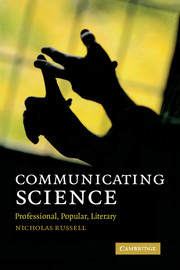Book contents
- Frontmatter
- Contents
- Introduction: What this book is about and why you might want to read it
- Prologue: Three orphans share a common paternity: professional science communication, popular journalism and literary fiction are not as separate as they seem
- Part I Professional science communication
- Part II Science for the public: what science do people need and how might they get it?
- 6 The public understanding of science (PUS) movement and its problems
- 7 Public engagement with science and technology (PEST): good principle, difficult practice
- 8 Citizen scientists? Democratic input into science policy
- 9 Teaching and learning science in school: implications for popular science communication
- Part III Popular science communication: the press and broadcasting
- Part IV The origins of science in cultural context: five historic dramas
- Part V Science in literature
- Index
- References
6 - The public understanding of science (PUS) movement and its problems
Published online by Cambridge University Press: 02 December 2010
- Frontmatter
- Contents
- Introduction: What this book is about and why you might want to read it
- Prologue: Three orphans share a common paternity: professional science communication, popular journalism and literary fiction are not as separate as they seem
- Part I Professional science communication
- Part II Science for the public: what science do people need and how might they get it?
- 6 The public understanding of science (PUS) movement and its problems
- 7 Public engagement with science and technology (PEST): good principle, difficult practice
- 8 Citizen scientists? Democratic input into science policy
- 9 Teaching and learning science in school: implications for popular science communication
- Part III Popular science communication: the press and broadcasting
- Part IV The origins of science in cultural context: five historic dramas
- Part V Science in literature
- Index
- References
Summary
Daisy the cat had a pretty good life all things considered, finally fading away when she was nearly 22 years old. Five years earlier she had urinary problems and we took her to the vet. Tests suggested she had partial kidney failure and the vet recommended special diets but Daisy refused to touch them. We gave up and let her eat what she liked and she lived on happily until her last few frail months. We buried her in the garden, the spot marked by a jovial, pipe-smoking concrete gnome.
The vet who diagnosed Daisy's kidney problems was a young and modern man. Veterinary practice is firmly based on scientific understanding and the vet told us a science story, explaining renal physiology and what had gone wrong and how a change of diet might help. I used to teach physiology and I think he gave an accurate 3-minute lecture. But most pet owners don't have past lives as physiology teachers, so the intense lesson would mean little to them. The information only makes sense if the listener already has a good grounding in the area; some familiarity with the vocabulary and concepts. Otherwise, while the lesson is delivered in good English, it conveys no real meaning. What we really needed was prognosis; how serious is this condition, how life-threatening or shortening is it likely to be, what happens if she doesn't like the diets, is she now or likely in the future to be in pain? But on these matters the vet was silent, and as he had other patients barking and mewing outside there was no time to ask him. […]
- Type
- Chapter
- Information
- Communicating ScienceProfessional, Popular, Literary, pp. 69 - 82Publisher: Cambridge University PressPrint publication year: 2009



